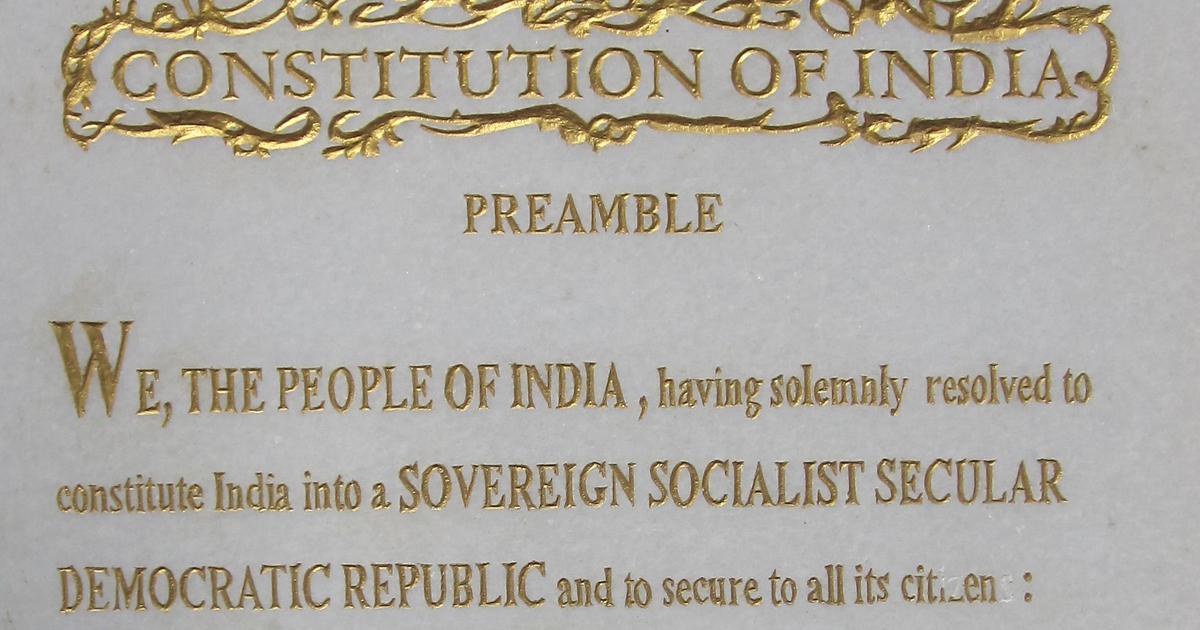Preamble
Image by Amazon.in
What is Preamble of the Indian Constitution?
The preamble is an Introductory document that gives an insight into the Philosophy of the Constitution.
The preamble is basically a modified version of the ‘Objectives Resolution’ that was moved by Jawaharlal Nehru.
Important Keywords in The preamble
SOVEREIGNTY (Samprabhuta)
- Absolute independence
- The government which is not controlled by any other power.
- A country cannot have its own constitution without being sovereign.
- For example:
- India is Sovereign because it has its own constitution and is not controlled by any other power on other hand Northern Ireland, Wales, Scotland, and England, which are non-sovereign parts of the United Kingdom.
SOCIALIST (Samajvadi)
- The word ‘Socialism’ had been used in the context of economic planning.
- This word was not there in the original Preamble, 42nd Amendment, 1976 incorporated ‘Socialist’ and ‘Secular’.
- The actual meaning of Socialism is different from what the Indian constitution percept, We adopted "Democratic Socialism ".
SECULARISM (Dharmnirpekshta)
- According to Oxford Dictionary Secularism is the belief that religion should not be involved in the organization of society, education, etc.
- Indian Concept of secularism is different than actual meaning.
- In India, there will be no ‘State’ religion.
- ‘State’ will not support any particular religion out of the public fund
- Every individual is free to believe in, and practice, any religion he/ she belongs to.
- The state will not discriminate against any individual or group on the basis of religion.
DEMOCRATIC REPUBLIC
- “Republic” - indicates a government by the people and for the people
- The government is elected by the people, it is responsible and accountable to the people
- The preamble declares India as a Republic - It means that the head of The state is the President who is indirectly elected and he is not a hereditary ruler as in the case of the British Monarch.
JUSTICE (Nyaya)
- Justice in the Preamble means social, political and economical justice.
- Social and economical justice ensured through DPSP.
- Political justice is ensured through Fundamental Rights.
- The ideal of justice—social, economic and political—has been taken from the Russian Revolution (1917).
LIBERTY
- Liberty is the essential requirement of a democratic and free society.
- The term ‘liberty’ means the absence of restraints on the activities of individuals, and at the same time, providing opportunities for the development of individual personalities.
- The ideals of liberty, equality and fraternity in our Preamble have been taken from the French Revolution (1789–1799).
EQUALITY (Samaanta)
- The Preamble secures to all citizens of India equality of status and opportunity.
- This provision embraces three dimensions of equality—civic, political and economic.
FRATERNITY (Bhaichara)
- Fraternity means a sense of brotherhood. (assured by the system of single citizenship)
- The Preamble declares that fraternity has to assure two things— the dignity of the individual and the unity and integrity of the nation.
- The term Fraternity is (perhaps) incorporated from article 1 of Universal Declaration of Human Rights 1948.
Important Judgements
Berubari's case 1960 - Supreme Court held that "Preamble if NOT a part of the constitution”
Kesavananda Bharti case 1973 - Supreme Court ruled that “Preamble is a part of the constitution and can be amended”
Important things should be noted
- The Preamble is neither a source of power to legislature nor a prohibition upon the powers of the legislature.
- It is non-justiciable, that is, its provisions are not enforceable in courts of law.
The Preamble, in brief, explains the objectives of the Constitution i.e., about the structure of the governance and about the ideals to be achieved in independent India.









No comments:
Post a Comment